Module 3 Unit 1 Has it arrived yet? 复习课件(共21张PPT)
文档属性
| 名称 | Module 3 Unit 1 Has it arrived yet? 复习课件(共21张PPT) |  | |
| 格式 | pptx | ||
| 文件大小 | 566.9KB | ||
| 资源类型 | 教案 | ||
| 版本资源 | 外研版 | ||
| 科目 | 英语 | ||
| 更新时间 | 2024-06-14 17:38:43 | ||
图片预览

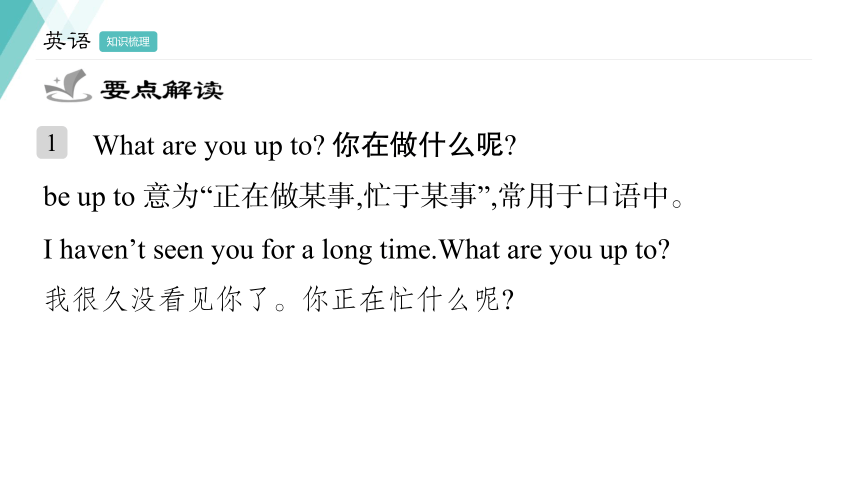
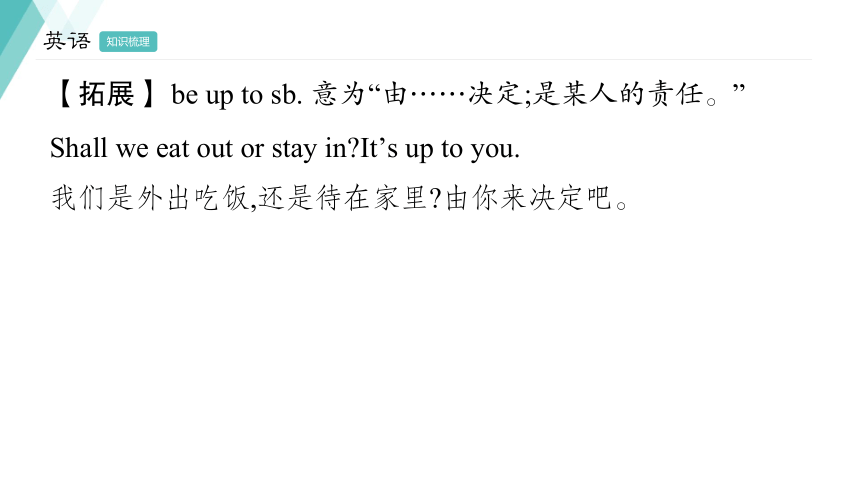
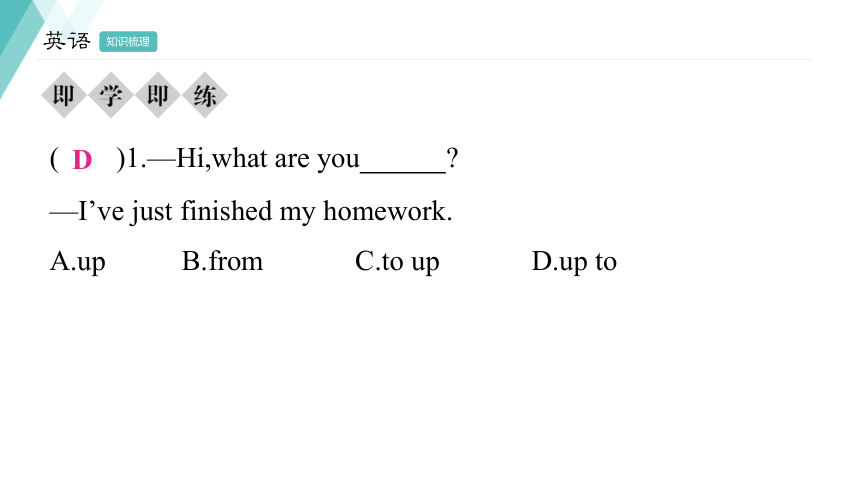
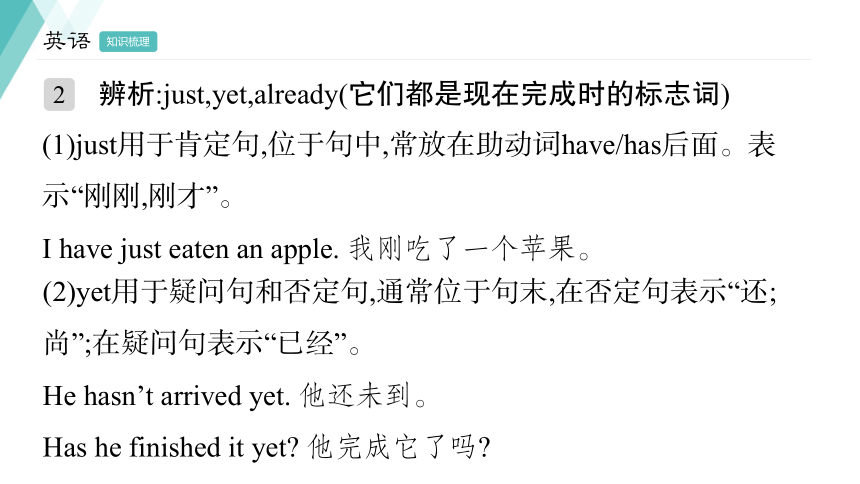
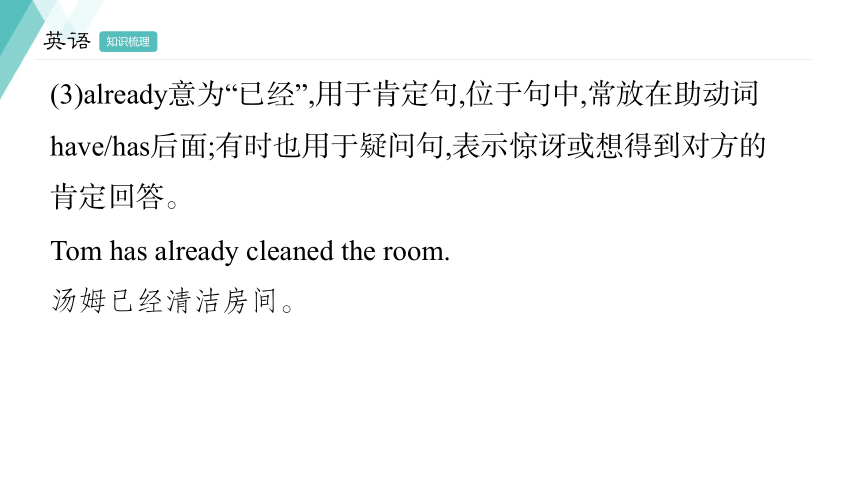
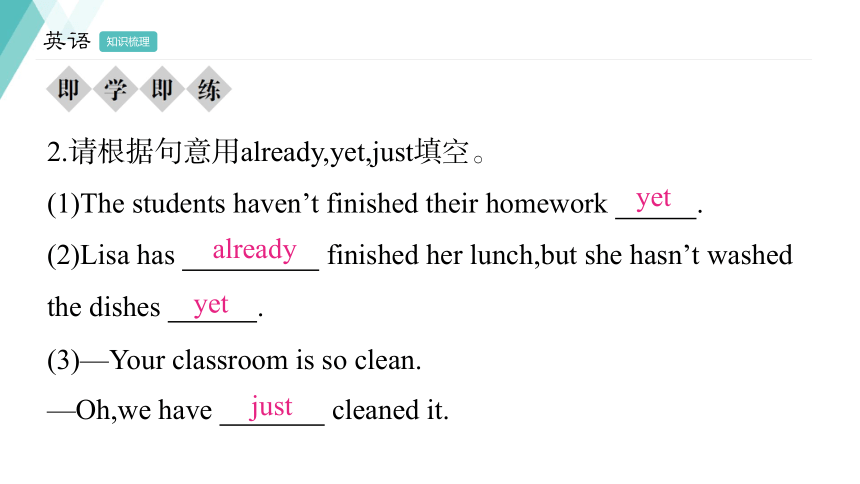
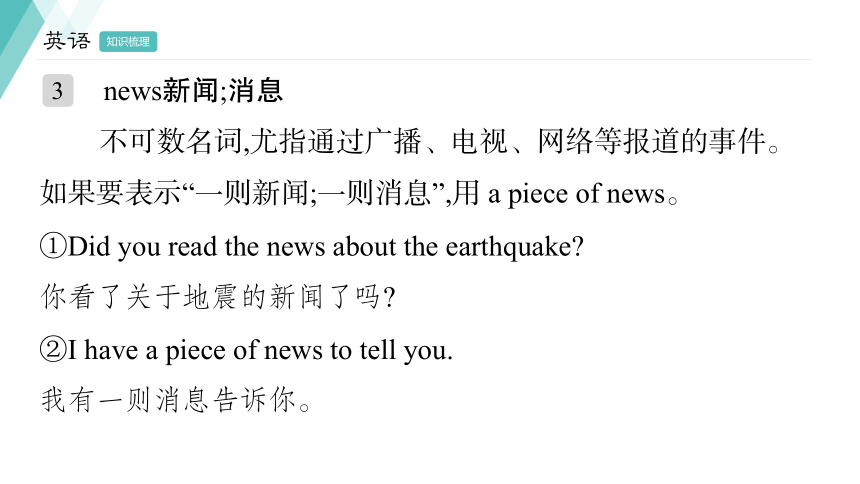
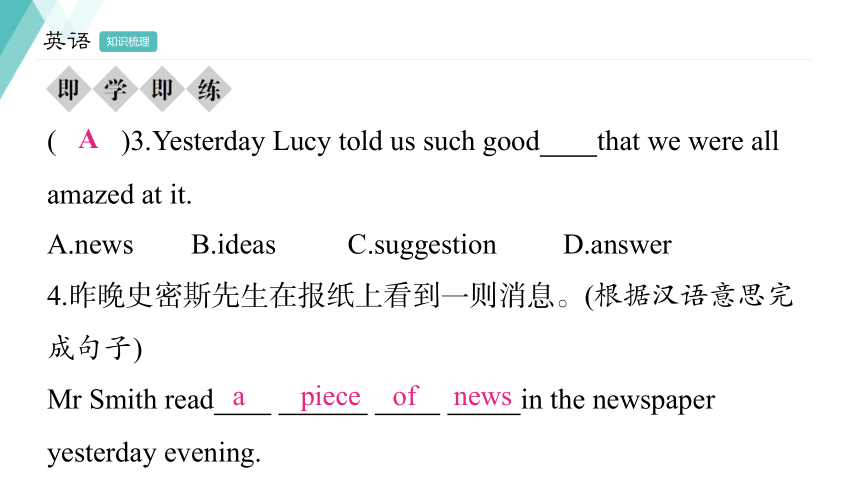
文档简介
(共21张PPT)
Unit1 It smells delicious.
外研社版 八年级英语下册
英语
知识梳理
1
What are you up to 你在做什么呢
be up to 意为“正在做某事,忙于某事”,常用于口语中。
I haven’t seen you for a long time.What are you up to
我很久没看见你了。你正在忙什么呢
英语
知识梳理
【拓展】 be up to sb. 意为“由……决定;是某人的责任。”
Shall we eat out or stay in It’s up to you.
我们是外出吃饭,还是待在家里 由你来决定吧。
英语
知识梳理
( )1.—Hi,what are you
—I’ve just finished my homework.
A.up B.from C.to up D.up to
D
英语
知识梳理
2
辨析:just,yet,already(它们都是现在完成时的标志词)
(1)just用于肯定句,位于句中,常放在助动词have/has后面。表示“刚刚,刚才”。
I have just eaten an apple. 我刚吃了一个苹果。
(2)yet用于疑问句和否定句,通常位于句末,在否定句表示“还;尚”;在疑问句表示“已经”。
He hasn’t arrived yet. 他还未到。
Has he finished it yet 他完成它了吗
英语
知识梳理
(3)already意为“已经”,用于肯定句,位于句中,常放在助动词have/has后面;有时也用于疑问句,表示惊讶或想得到对方的肯定回答。
Tom has already cleaned the room.
汤姆已经清洁房间。
英语
知识梳理
2.请根据句意用already,yet,just填空。
(1)The students haven’t finished their homework .
(2)Lisa has finished her lunch,but she hasn’t washed the dishes .
(3)—Your classroom is so clean.
—Oh,we have cleaned it.
yet
already
yet
just
英语
知识梳理
3
news新闻;消息
不可数名词,尤指通过广播、电视、网络等报道的事件。如果要表示“一则新闻;一则消息”,用 a piece of news。
①Did you read the news about the earthquake
你看了关于地震的新闻了吗
②I have a piece of news to tell you.
我有一则消息告诉你。
英语
知识梳理
( )3.Yesterday Lucy told us such good that we were all amazed at it.
A.news B.ideas C.suggestion D.answer
4.昨晚史密斯先生在报纸上看到一则消息。(根据汉语意思完成句子)
Mr Smith read in the newspaper yesterday evening.
A
a
piece
of
news
英语
知识梳理
4
reach, get to 与 arrive 的区别
reach 及物动词,意为“到达”。 后面必须接表地点的名词作宾语。
get to 意为“到达”。 get to+地点,但是后接地点副词如here, there, home等时要省略介词to。
arrive 不及物动词,意为“到达”。 后接宾语时要加介词in(大地点)或at(小地点)。若后接表示地点的副词如here, there, home等,则不用介词。
英语
知识梳理
①At 7 o’clock,we reached the railway station.
我们7点钟到了火车站。
② When did you get to the park
你什么时候到公园的
③ I arrived in Beijing last night.
我昨天晚上到达北京。
④He arrived at the park at 5∶00 pm.
他下午五点钟到达公园。
英语
知识梳理
( )5.He was tired when he home.
A.reached to B.arrived at C.got to D.got
( )6.Have we the zoo yet
A.reached at B.arrived in
C.got D.arrived at
D
D
英语
知识梳理
5
That’s why... 的用法
That’s why...意为“这就是……的原因”,后面跟的是结果。
That’s why I left school and why I was angry.
这就是我离开学校和生气的原因。
【拓展】 That’s because...意为“那是因为……”,后面跟的是原因。
He didn’t come to school.That’s because he was ill.
他没来上学。那是因为他病了。
英语
知识梳理
( )7.You have spent too much time playing computer games.That’s your eyes hurt.
A.why B.how C.what D.when
A
英语
知识梳理
6
discover,find,find out与look for的区别
(1)discover [及物动词] 发现;找到。
通常用于指发现他人尚未发现但已经存在的东西。
(2)find 表示“找到”,强调“寻找”的结果。
(3)find out 意为“查明;弄明白”,是经过研究、计算、探询、调查等之后搞清楚、弄明白。
英语
知识梳理
(4)look for 表示“寻找”的过程和动作。
①Who discovered America
谁发现了美洲
②I can’t find my pen.I’m looking for it everywhere.
我找不到我的钢笔。我正到处找它。
③Please find out when the train leaves.
请查一下火车什么时候离站。
英语
知识梳理
8.用discover, find, look for 或 find out 的适当形式填空。
(1)Where did you your phone
(2)Please who broke the window.
(3)—What are you doing
—I am my cat,but I can’t it.
(4)The scientists have a new type of plant in Amazon(亚马逊).
find
find out
looking for
find
discovered
英语
知识梳理
7
in order to 为了做某事
表示目的,可位于句首或句中,其否定形式为in order not to do sth.,可与 so that 引导的目的状语从句进行同义转换。
In order to see it clearly,he climbed higher.
=He climbed higher in order to see it clearly.
=He climbed higher so that he could see it clearly.
为了看得更清楚,他爬得更高。
英语
知识梳理
【拓展】 in order that 意为“为了……”,引导目的状语从句,引导的从句可与 so that相互转换。
He works hard in order that/so that he can go abroad.
为了能出国他努力工作。
英语
知识梳理
9.他早起是为了赶上早班车。(根据汉语意思完成句子)
He got up early the early bus.
in
order
to
catch
谢谢观看
外研社版 八年级英语下册
This is the last of the postings.
Thank you for watching.
知识梳理
Unit1 It smells delicious.
外研社版 八年级英语下册
英语
知识梳理
1
What are you up to 你在做什么呢
be up to 意为“正在做某事,忙于某事”,常用于口语中。
I haven’t seen you for a long time.What are you up to
我很久没看见你了。你正在忙什么呢
英语
知识梳理
【拓展】 be up to sb. 意为“由……决定;是某人的责任。”
Shall we eat out or stay in It’s up to you.
我们是外出吃饭,还是待在家里 由你来决定吧。
英语
知识梳理
( )1.—Hi,what are you
—I’ve just finished my homework.
A.up B.from C.to up D.up to
D
英语
知识梳理
2
辨析:just,yet,already(它们都是现在完成时的标志词)
(1)just用于肯定句,位于句中,常放在助动词have/has后面。表示“刚刚,刚才”。
I have just eaten an apple. 我刚吃了一个苹果。
(2)yet用于疑问句和否定句,通常位于句末,在否定句表示“还;尚”;在疑问句表示“已经”。
He hasn’t arrived yet. 他还未到。
Has he finished it yet 他完成它了吗
英语
知识梳理
(3)already意为“已经”,用于肯定句,位于句中,常放在助动词have/has后面;有时也用于疑问句,表示惊讶或想得到对方的肯定回答。
Tom has already cleaned the room.
汤姆已经清洁房间。
英语
知识梳理
2.请根据句意用already,yet,just填空。
(1)The students haven’t finished their homework .
(2)Lisa has finished her lunch,but she hasn’t washed the dishes .
(3)—Your classroom is so clean.
—Oh,we have cleaned it.
yet
already
yet
just
英语
知识梳理
3
news新闻;消息
不可数名词,尤指通过广播、电视、网络等报道的事件。如果要表示“一则新闻;一则消息”,用 a piece of news。
①Did you read the news about the earthquake
你看了关于地震的新闻了吗
②I have a piece of news to tell you.
我有一则消息告诉你。
英语
知识梳理
( )3.Yesterday Lucy told us such good that we were all amazed at it.
A.news B.ideas C.suggestion D.answer
4.昨晚史密斯先生在报纸上看到一则消息。(根据汉语意思完成句子)
Mr Smith read in the newspaper yesterday evening.
A
a
piece
of
news
英语
知识梳理
4
reach, get to 与 arrive 的区别
reach 及物动词,意为“到达”。 后面必须接表地点的名词作宾语。
get to 意为“到达”。 get to+地点,但是后接地点副词如here, there, home等时要省略介词to。
arrive 不及物动词,意为“到达”。 后接宾语时要加介词in(大地点)或at(小地点)。若后接表示地点的副词如here, there, home等,则不用介词。
英语
知识梳理
①At 7 o’clock,we reached the railway station.
我们7点钟到了火车站。
② When did you get to the park
你什么时候到公园的
③ I arrived in Beijing last night.
我昨天晚上到达北京。
④He arrived at the park at 5∶00 pm.
他下午五点钟到达公园。
英语
知识梳理
( )5.He was tired when he home.
A.reached to B.arrived at C.got to D.got
( )6.Have we the zoo yet
A.reached at B.arrived in
C.got D.arrived at
D
D
英语
知识梳理
5
That’s why... 的用法
That’s why...意为“这就是……的原因”,后面跟的是结果。
That’s why I left school and why I was angry.
这就是我离开学校和生气的原因。
【拓展】 That’s because...意为“那是因为……”,后面跟的是原因。
He didn’t come to school.That’s because he was ill.
他没来上学。那是因为他病了。
英语
知识梳理
( )7.You have spent too much time playing computer games.That’s your eyes hurt.
A.why B.how C.what D.when
A
英语
知识梳理
6
discover,find,find out与look for的区别
(1)discover [及物动词] 发现;找到。
通常用于指发现他人尚未发现但已经存在的东西。
(2)find 表示“找到”,强调“寻找”的结果。
(3)find out 意为“查明;弄明白”,是经过研究、计算、探询、调查等之后搞清楚、弄明白。
英语
知识梳理
(4)look for 表示“寻找”的过程和动作。
①Who discovered America
谁发现了美洲
②I can’t find my pen.I’m looking for it everywhere.
我找不到我的钢笔。我正到处找它。
③Please find out when the train leaves.
请查一下火车什么时候离站。
英语
知识梳理
8.用discover, find, look for 或 find out 的适当形式填空。
(1)Where did you your phone
(2)Please who broke the window.
(3)—What are you doing
—I am my cat,but I can’t it.
(4)The scientists have a new type of plant in Amazon(亚马逊).
find
find out
looking for
find
discovered
英语
知识梳理
7
in order to 为了做某事
表示目的,可位于句首或句中,其否定形式为in order not to do sth.,可与 so that 引导的目的状语从句进行同义转换。
In order to see it clearly,he climbed higher.
=He climbed higher in order to see it clearly.
=He climbed higher so that he could see it clearly.
为了看得更清楚,他爬得更高。
英语
知识梳理
【拓展】 in order that 意为“为了……”,引导目的状语从句,引导的从句可与 so that相互转换。
He works hard in order that/so that he can go abroad.
为了能出国他努力工作。
英语
知识梳理
9.他早起是为了赶上早班车。(根据汉语意思完成句子)
He got up early the early bus.
in
order
to
catch
谢谢观看
外研社版 八年级英语下册
This is the last of the postings.
Thank you for watching.
知识梳理
同课章节目录
- Module 1 Feelings and impressions
- Unit 1 It smells delicious.
- Unit 2 I feel nervous when I speak Chinese .
- Unit 3 Language in use
- Module 2 Experiences
- Unit 1 I've also entered lots of speaking competi
- Unit 2 They have seen the Pyramids.
- Unit 3 Language in use
- Module 3 Journey to space
- Unit 1 Has it arrived yet?
- Unit 2 We have not found life on any other planet
- Unit 3 Language in use
- Module 4 Seeing the docto
- Unit 1 I haven't done much exercise since I got m
- Unit 2 We have played football for a year now
- Unit 3 Language in use
- Module 5 Cartoons
- Unit 1 It's time to watch a cartoon.
- Unit 2 Tintin has been popular for over eighty yea
- Unit 3 Language in use
- Revision module A
- Module 6 Hobbies
- Unit 1 Do you collect anything ?
- Unit 2 Hobbies can make you grow as a person.
- Unit 3 Language in use
- Module 7 Summer in Los Angeles
- Unit 1 Please write to me and send me some photos
- Unit 2 Fill out a form and come to learn English
- Unit 3 Language in use
- Module 8 Time off
- Unit 1 I can hardly believe we are in the city ce
- Unit 2 We thought somebody was moving about
- Unit 3 Language in use
- Module 9 Friendship
- Unit 1 Could I ask if you've mentioned this to he
- Unit 2 I believe that the world is what you think
- Unit 3 Language in use
- Module 10 On the radio
- Unit 1 I hope that you can join us one day
- Unit 2 It seemed that they were speaking to me in
- Unit 3 Language in use
- Revision module B
